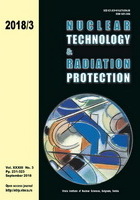
MEASUREMENT OF INDOOR RADON CONCENTRATIONS IN DIFFERENT DWELLINGS IN ARAR, SAUDI ARABIA

Vol.
XXXIII, No. 3, Pp. 231-323
September 2018
UDC 621.039+614.876:504.06
ISSN 1451-3994
Pages: 293-300
Authors: Ayman M. Abdalla and Samy El-GamalAbstract
Indoor radon concentrations in 33 dwellings in Arar city were measured using a CR-39 detector. This work is the first in the region and was done to assess the health risks. The exposure time was about 4 months, from May to September 2017. It was found that the indoor radon concentration changed in the range from 7.7 to 89.1 Bqm-3 with an overall average of 44.05 ± 6.21 Bqm-3 while the geometric mean is 39.51 Bqm-3 with a geometric standard deviation of 1.67. These values are within the acceptable level set by the International Committee for Radiation Protection. The annual effective dose received by the population of Arar was reported and it varied in the range 0.16 - 1.82 mSv with an average value of 0.9 ± 0.16 mSv and the geometric mean is 0.81 mSv. The exposure to radon progeny was studied where the minimum, maximum, average, and geometric mean of exposure are 0.83·10-3, 9.63·10-3, 4.76 ± 0.67·10-3 and 5.05·10-3 WLM, respectively. Finally, for the estimation of cancer risks, the excess lifetime cancer risk was investigated. Its average value was 3.7·10-3 which is relatively higher.
Key words: radon concentration, indoor radon, dwelling, CR-39, Arar, Saudi Arabia
FULL PAPER IN PDF FORMAT (1.67 MB)